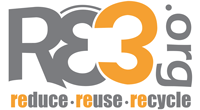
Guest Blogger: Bianca Howard, City of Raleigh
Last fall, the City of Raleigh launched an incentive-based campaign to increase participation in curbside recycling. Approximately 107,000 households were eligible to win the contest. To take part, a resident simply had to place a special sticker on the green recycling bin and put it out on the appropriate day, filled only with materials accepted in Raleigh’s recycling program. Contest sponsors included Coca-Cola Bottling Company Consolidated, Harris Teeter, Inc. and the North Carolina state government division formerly known as Pollution Prevention and Environmental Assistance. Each week for 26 weeks, 10 winners were chosen and each rewarded with a $50 gift card to spend at Harris Teeter.
A few months have passed since the contest ended, and I’d like to share what I learned.
1. People don’t read! We mailed contest rules and stickers to all eligible households. This piece listed all 14 acceptable items, as well as a few examples of things that are not recyclable in the green bins. Despite this information distribution, it was surprisingly hard to find winners. Plastic bags and non-bottle plastics, like produce boxes and sour cream tubs, were the most common items that kept recyclers from being rewarded.
2. Promote the winners. Several times as I conducted the Prize Patrol, residents would stop me and say, “Oh, I wondered if that contest was really happening.” We didn’t advertise the winners because newspaper advertising seemed really expensive. In hindsight, we should have at least listed the winners on the City of Raleigh website. We squandered an opportunity to build on the increased awareness in recycling and keep participation high after the six-month contest ended.
3. Recycling went up! Was it the thrill of saving $50 on groceries or simply population growth? I don’t have the statistical skills to tease out all the factors that may have contributed to the 10.7 percent increase in tonnage we saw during the six months of the campaign. Compared to the same period in the previous year, requests for recycling bins grew by a whopping 33.9 percent.
What will we do differently? This incentive-based campaign opened my eyes to weaknesses in our education program. People don’t take the time to read, or maybe they don’t understand the words we use. Contamination wasn’t limited by geography or income, shattering my personal myth that residents in more affluent northeast Raleigh are perfect recyclers. We’re applying our experience to the educational campaign for our transition to biweekly recycling using carts. Check out the graphic that adorns the new cart lids. When it comes to knowing what to recycle, do pictures speak louder than words?

No comments:
Post a Comment